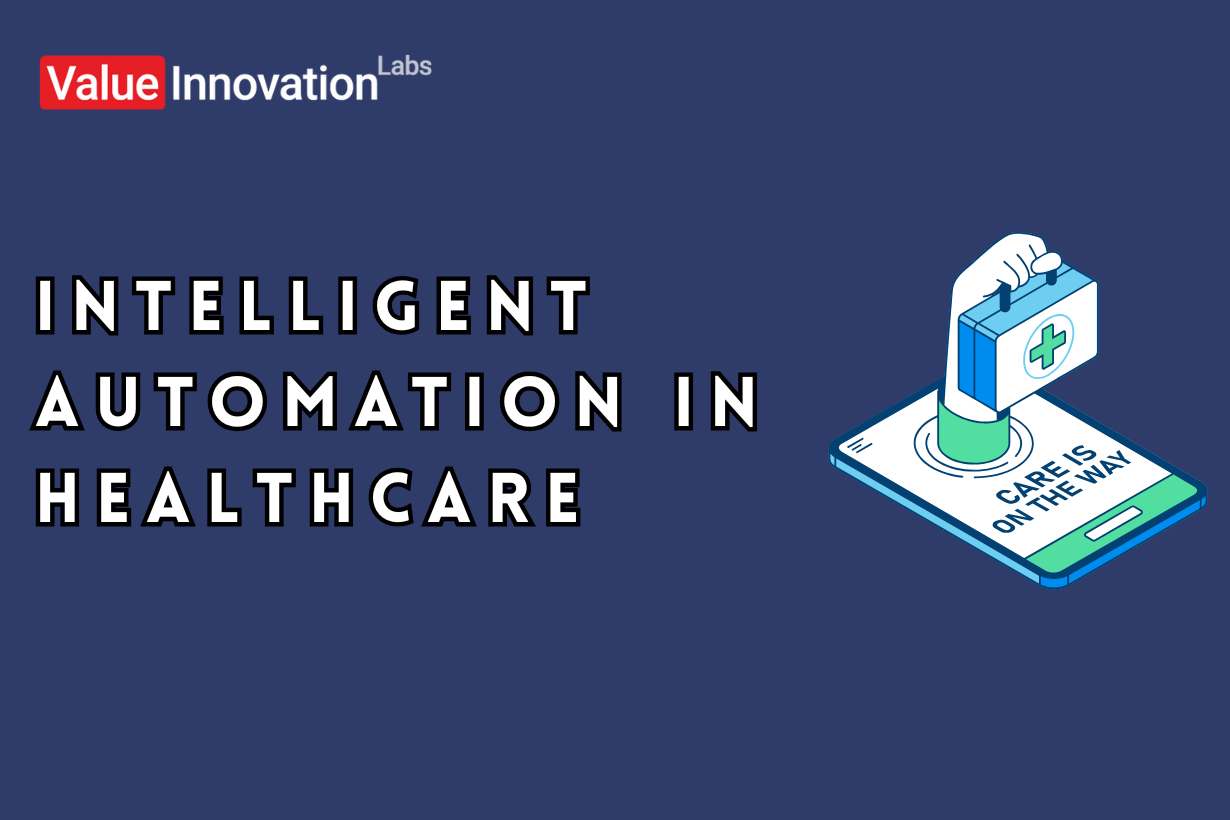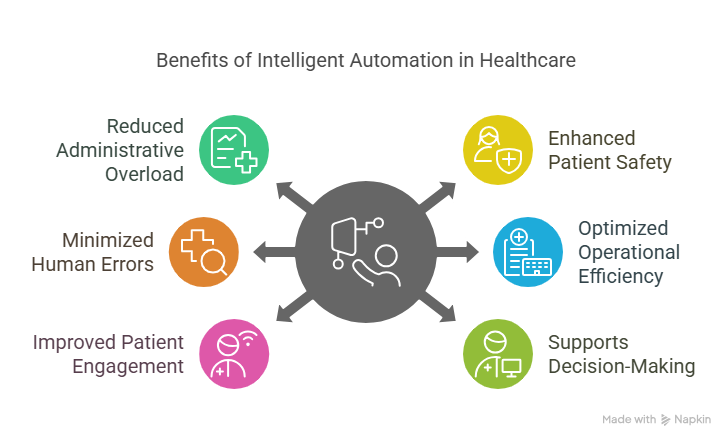
Intelligent Automation in Healthcare: Streamlining Processes and Enhancing Patient Care
- by Indu Sharma
In today’s fast-changing world, healthcare is no exception to digital transformation. As we step further into 2025, intelligent automation is playing a crucial role in redefining how care is delivered and managed. From cutting down administrative delays to helping doctors make faster and more accurate decisions, intelligent automation in healthcare is bringing meaningful change across the board.
Think of a system where patient histories are automatically updated, appointments are scheduled without back-and-forth, and alerts are sent the moment something’s off with a patient’s vitals. That’s the kind of efficiency we’re seeing today, made possible by healthcare intelligent automation.
In this blog, we’ll explore what this transformation looks like, why it matters, and how leading-edge automation is enhancing patient care, improving hospital efficiency, and paving the way for a smarter healthcare ecosystem in 2025 and beyond.
What is Intelligent Automation in Healthcare?
Intelligent automation (IA) combines artificial intelligence (AI), machine learning (ML), robotic process automation (RPA), and analytics to automate both repetitive and complex tasks. In healthcare, IA is used to process massive volumes of patient data, support clinical decisions, and handle operations more efficiently.
Key applications include:
– Automating patient onboarding and medical history collection
– Recommending treatment options based on real-time data
– Managing billing and claims processing
– Supporting clinical diagnostics and surgical procedures
– Sending alerts for patient vitals and medication adherence
– Tracking resource utilization and optimizing facility workflows
The advantage of IA lies in its ability to learn and adapt, making healthcare systems smarter over time.
Why Intelligent Automation Matters in Healthcare

- Reduces Administrative Overload – Doctors and healthcare professionals often spend significant time on documentation. IA automates data entry, medical records updates, and scheduling freeing up time for direct patient care.
- Enhances Patient Safety – Automation tools monitor vitals, flag abnormalities, and suggest proactive measures. Predictive analytics can prevent complications before they occur.
- Minimizes Human Errors – Automated workflows reduce the risk of manual errors in medication administration, test reporting, or patient instructions, ensuring greater accuracy.
- Optimizes Operational Efficiency – Hospitals can use IA for inventory control, staff allocation, and asset tracking. Real-time dashboards help administrators make informed decisions.
- Improves Patient Engagement – AI-powered chatbots and virtual assistants guide patients through check-ins, appointment booking, and follow-up care. They offer round-the-clock support.
- Supports Decision-Making – AI systems assist doctors with treatment recommendations by analyzing lab reports, patient histories, and medical literature, thereby reducing diagnostic errors and improving outcomes.
Real-World Healthcare Automation in 2025
a. Smart Patient Onboarding
Patients fill out digital forms pre-visit, which AI systems analyze to determine case priority and assign doctors accordingly.
b. Intelligent Imaging Analysis
AI tools now assist radiologists by interpreting CT scans, MRIs, and X-rays, flagging potential issues with high precision.
c. Virtual Health Assistants
These assistants help patients manage chronic conditions by reminding them to take medications, attend appointments, or track symptoms.
d. Surgical Support Systems
AI-driven robotics assists in surgeries with real-time data and precision guidance, improving success rates and reducing recovery times.
e. Streamlined Insurance Claims
Automation enables real-time verification, accurate billing, and faster claim settlements benefiting both providers and patients.
f. Wearable Integration
Healthcare automation now integrates with wearable devices to monitor glucose levels, heart rate, sleep patterns, and physical activity. Data from wearables feed into centralized platforms for analysis.
g. Telehealth Expansion
IA enables more efficient and accurate virtual consultations by summarizing symptoms, suggesting diagnoses, and preparing digital prescriptions instantly.
h. Pharmacy Automation
Intelligent automation is streamlining pharmacy operations by managing medication inventory, automating prescription refills, and ensuring compliance with safety protocols. Robotic dispensing systems are reducing wait times and improving accuracy in drug administration.
i. Emergency Response Systems
AI algorithms now assist emergency response teams by quickly analyzing incoming data from ambulances or wearable devices, ensuring hospitals are pre-alerted and prepared.
Challenges in Adopting Healthcare Intelligent Automation
- Data Privacy & Security
Protecting patient information remains a top priority. Organizations must ensure compliance with HIPAA and other data regulations.
- Legacy Systems
Older hospital systems often don’t integrate easily with modern IA tools. Transitioning requires thoughtful investment and planning.
- Training and Adoption
Healthcare workers need training to adopt new tools confidently. Human and machine collaboration is key for success.
- Ethical & Legal Considerations
As AI tools influence medical decisions, clear accountability frameworks are necessary to address errors or bias.
- Initial Costs
Despite long-term ROI, the upfront costs of automation implementation may deter smaller institutions.
Future Outlook: Healthcare Automation 2025 and Beyond
Looking ahead, healthcare automation is poised to drive deeper transformations:
– Predictive Healthcare: Combining genomics, wearables, and behavior data to detect diseases before symptoms arise.
– AI-Powered Consultations: Virtual care solutions offering real-time consultations and diagnosis for common health issues.
– Autonomous Hospital Systems: Facilities with connected systems that monitor everything from patient beds to pharmaceutical stocks.
– At-Home Care Models: Automation extends into homes with devices that monitor vitals, schedule visits, and communicate with doctors remotely.
– Personalized Medicine: AI uses genetic data and patient history to suggest individualized treatment plans, reducing trial-and-error in medications.
– Global Collaboration: Automated data exchange across countries and health systems helps track pandemics, study diseases, and share breakthroughs.
– Mental Health Monitoring: Advanced algorithms analyze speech, text, and behavior patterns through apps to detect early signs of anxiety, depression, or burnout, prompting early intervention and care.
How Value Innovation Labs Supports Healthcare Transformation
At Value Innovation Labs, we create intelligent automation solutions that cater specifically to the unique challenges of healthcare providers:
- Custom RPA Solutions that automate scheduling, documentation, and billing processes
- AI Decision Support Tools for enhanced diagnosis and treatment planning
- Engagement Chatbots that boost patient satisfaction and retention
- Secure Data Infrastructure that ensures compliance with all regulatory standards
- Integrated Dashboards to monitor hospital performance, bed occupancy, and resource utilization in real time
We understand that every healthcare institution is different. That’s why our solutions are flexible, scalable, and designed to deliver tangible results.
Conclusion
Healthcare automation in 2025 is no longer futuristic, it’s the present reality that’s improving outcomes every day. From easing clinician workloads to empowering patients, intelligent automation is helping build a smarter, safer, and more efficient healthcare system. The path ahead is filled with potential, and now is the time to embrace it.
Connect with Value Innovation Labs to discover how intelligent automation can revolutionize your healthcare operations.
In today’s fast-changing world, healthcare is no exception to digital transformation. As we step further into 2025, intelligent automation is…
